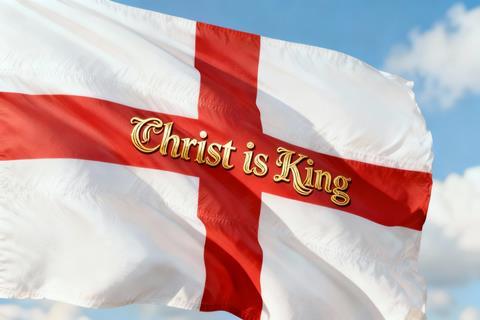As ‘Christ is King’ echoes through street protests, Rev Jamie Sewell notes the same words can represent hope to some and threat to others. That’s why it’s time for the Church to get involved, he says. This moment represents a remarkable opportunity for our evangelism and discipleship

As we sat around the table, I was scraping the last few grains of jollof rice from my plate. Connor was busy licking the remnants of chicken off the bone, Nigerian-style wings, generously cooked by Tope’s mum. The room smelled of spice and home cooking, the kind that tells you you’re welcome before anyone says a word.
We were just about to launch into our Bible study when Tope looked up and asked, “So…what do you lot think about this ‘Unite the Kingdom’ business?”
Topé is six-foot-five with Nigerian heritage, born in the UK and, as far as I’m concerned, as British as I am. His question hung in the air for a second longer than expected. We all knew this wasn’t just about a march or a slogan. Identity. Faith. Flags. Brotherhood. And what it really means to be British. It was also about fear.
As we started to discuss, it became clear that each of us, depending on our heritage and background, was seeing the same events through a very different lens.
For me, when I’ve seen England flags hanging from windows or painted across zebra crossings, I’ve read them as a sign of frustration, a protest from people I know. Working-class people. People whose towns and communities are carrying the real weight of integration. They’re hearing government ministers and public figures say that immigration is only ever positive, good for the economy, good for culture, but their lived experience feels very different.
To them, those flags are a message. A cry of protest. We’re not happy with how you’re managing this country. It’s a challenge to the political elite.
But when I spoke with Tope, what he saw was something else entirely.
He saw a threat. A territorial marker that says: This place is not for you. For Tope, those flags didn’t speak of political frustration; they stirred fear. A fear that anyone whose skin isn’t white might not be safe walking down their own street. A fear that beneath the talk of “pride” and “tradition” there was racist, dangerous, violent intent.
And then come the chants, the shout that echoes through these protests: “Christ is King!”
But what does that really mean?
Well, again, it depends on whose ears are receiving the message.
For me, it strikes a chord of possibility. An opportunity for the many men I’ve been praying for since coming to faith 30 years ago. People who are concluding that Britishness was built, at least in part, on the teachings of Jesus. That our laws, our values, our identity have roots in something deeper than flags or borders. And in that search for meaning, some of them have become genuinely open, to exploring the person of Jesus.
But when I speak to my Muslim neighbours, the words land very differently. To them, “Christ is King!” doesn’t sound like hope. It sounds like hatred, or at least exclusion. They hear it as a message that says: If you believe differently, if you don’t follow Christ, you’re not British. And you’re not welcome on these isles.
And once again, we’re left with the same phrase, spoken in public, received in profoundly different ways.
Responsibility
And as I discuss all this with my Christian brothers, around a table full of beautiful Nigerian food, lovingly prepared by my Nigerian sister in Christ, it becomes apparent that we, as the Church, have a responsibility.
A responsibility not to ignore this moment. Not to reject those chanting “Christ is King!” outright. Not to write them off as racists or radicals. But also not to allow Christ’s name to be used as a banner of exclusion or hate.
We have a responsibility to disciple. To invite. To correct. To embody. Because if we truly believe that Christ is King, we must pursue that lived reality, not just proclaim it.
If people want these isles to be rooted in Christian culture, then they need to embrace the Christian message wholeheartedly. Not just the slogans. Not just the symbols. But the way of Jesus: radical love, humility, justice, repentance, forgiveness, sacrifice, and hope.
A nation that truly puts the cross of Jesus first, that centres itself not on bloodlines or borders, but on the mercy, justice, and love of Christ, is a nation that can be blessed. A kingdom that could actually be united.
Not by flags. Not by force. But by a shared surrender to the only King worth serving.
More on Unite the Kingdom
The challenge
I feel deeply privileged to live in a country that, in many ways, has been shaped by the teachings of Jesus. But when you say “Christ is King!”, you don’t get to pick and choose the parts of his kingship that suit you.
You don’t get to ignore the parable of the Good Samaritan. You don’t get to skip over “love your enemies”. You don’t get to silence the Jesus who defended the vulnerable, who welcomed the outsider, who forgave sinners, and who died for those who were wrong, not those who had it all together.
I understand the political and governmental dilemma of border control. There are practical issues that have to be addressed. But those are questions for policymakers and civil servants.
For the Church, and for anyone shouting “Christ is King”, the question isn’t primarily about who should stay or who should go. The real question is this: Are we living the kind of radical Christian life that could actually unite the kingdom?
If we really want this to be a Christian nation, we don’t get there by fear. We don’t get there by shouting down our neighbours. We don’t get there by deciding who belongs and who doesn’t based on belief or background.
Because if that’s our logic, who gets kicked out next? My nan, who doesn’t believe? Your atheist brother? What about Richard Dawkins, does he get to stay?
If we really want to battle for this to be a Christian country, that battle doesn’t begin with immigration policy. It begins in the human heart.
It begins with choosing to love those we disagree with. It begins with showing the beauty of Jesus through our actions, our hospitality, our kindness, our courage, and our truth-telling.
It begins with a Church, and a people, who live in such a way that the watching world can see why Christ is King.
The truth is, I don’t know what Jesus would do about border control. I don’t know what his policy on the economy would be. But I do know he would not want us to strike fear into the heart of our neighbours.
The opportunity
I remember standing on the terraces at Highfield Road as a teenager, cheering on Coventry City, at the same time as I was becoming radically excited about Christ. And as I looked across at the Sky Blue Army, shoulder to shoulder, chanting and shouting with passion, I used to dream: What if one day these same men were shouting the name of Jesus?
When I see images and hear the chants of men who look like those I stood beside on those terraces, shouting “Christ is King!”, I catch a glimpse of something I dreamt about.
I believe this is an opportunity. An opening. A chance for radical salvation and radical discipleship across a people group who have been alienated from the Church for far too long.
But I’m also afraid.
Because if the Church doesn’t come alongside these men, doesn’t disciple them, doesn’t teach them the full breadth of Christ’s message, then we may see a movement that does abhorrent things in the name of Jesus.
And we will have missed the moment.
And so, I want to end with a plea.
A plea for prayer.
A plea that this nation might be united, not by fear, not by flags, but by a fresh revelation that Christ is King.
A plea that the Church would not run from those shouting the name of Jesus in the street, simply for fear of being misunderstood or labelled. A plea that we won’t let this moment pass us by.
We need to pray for a Holy Spirit movement that transforms the hearts of the hateful, informs the minds of the misled, and mobilises the feet of Christ-followers to live and love like Jesus.
Let it begin with us.






































No comments yet